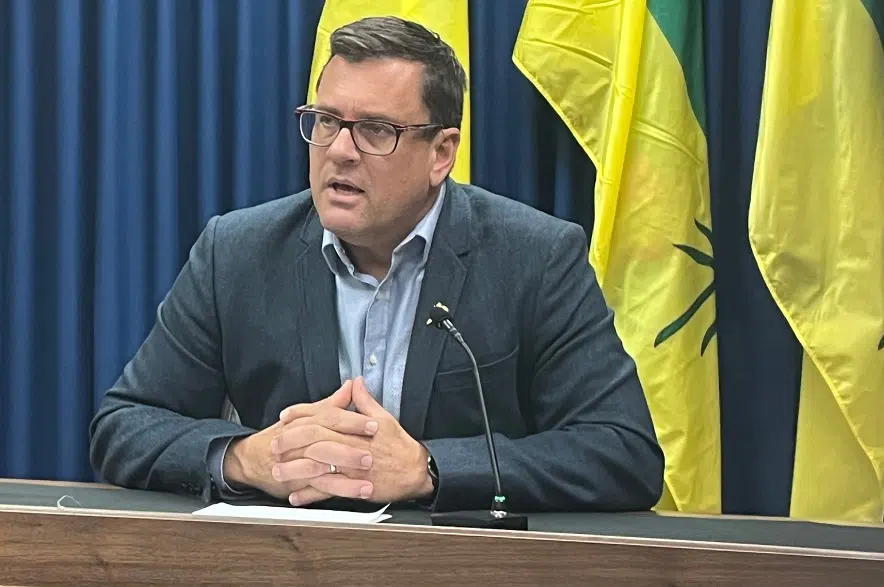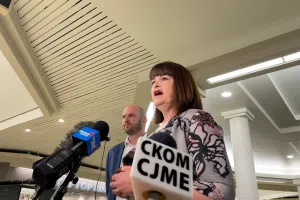Saskatchewan has accepted the federal government’s offer of increased health-care funding, but the provincial health minister says it falls short of Ottawa’s obligation.
The funding boost includes a one-time, $61-million investment and a $111-million annual cash injection to the province’s $6.4-billion health-care budget.
“We’re happy that the federal government has stepped up with some dollars,” Paul Merriman, Saskatchewan’s health minister, said Wednesday.
He said it’s a good opportunity for the federal government to start increasing its share of health-care funding up to 35 per cent of provincial costs.
Merriman said the federal government is currently covering around 22 to 23 per cent of provincial health-care costs, well below the 35 per cent that Canada’s premiers have asked for.
Premier Scott Moe in particular has been pushing the federal government to increase funding to that level, and expressed his disappointment with the lower-than-hoped-for offer when it was first announced.
“The federal government is not meeting their obligation. The provincial government has to backfill those dollars,” Merriman said. “It isn’t enough.”
According to Merriman, the federal government has asked for an action plan outlining where the funding will go, and said Ottawa wants the money to be invested in areas such as mental health and addictions, primary care, and care for seniors.
“There are some categories we need to meet on the federal government’s side of things,” Merriman said, noting the provincial government already has programs in those areas.
“What we’re going to provide them is a lot of the programs and incentives that we already have.”
Merriman said the province agreed to the deal, but the provincial government wants to see Ottawa’s share increase.
“It’s hard to turn down federal dollars. It’s just not exactly the amount that we were looking for, and we wanted to make sure that we had the ability to tailor those dollars for each (province’s) needs,” he added.
Part of the health deal includes the federal and provincial government “streamlining” the process of recognizing internationally educated health professionals. Merriman said that’s a goal at the provincial level as well.
“We want to be able to make it a very smooth process for them to be able to integrate into the Canadian health-care system,” Merriman said, adding the government wants to maintain high standards at the same time.
“We do not want to fast-track somebody that is not going to be practising at the top of their profession.”
Currently, 15 registered nurses from the Philippines have accepted offers to work in Saskatchewan, Merriman said, and the government is offering incentives of up to $10,000 to help with fees and travel costs.
“We want to streamline it as much as we possibly can for nurses coming in,” he said.
NDP leader calls for accountability
Carla Beck, leader of the Saskatchewan NDP, said the injection of cash into the province’s health-care system was needed – but not as badly as solutions proposed in part by people working in the system.
“None of this can be done in a small office,” Beck told reporters at the Legislative Building.
“None of this can be done without the input of those who are actually on the front lines (and those) in the 36 communities that we saw last summer with their emergency rooms shuttered.
“More money is needed, but thoughtful planning with input from those front-line workers, from the providers (and) from the communities is also needed.”
Beck said she would like to see the province use the federal funding to address a number of specific areas, including long-term care, mental health and addictions, and the retention of workers already in Saskatchewan.
“Recruitment is important, but this is a province that lost 600 health-care workers last year,” Beck said. “We have to stabilize physicians (and) health-care workers either leaving the profession or leaving the province.”
Most importantly, though, Beck said she wants to see the government be accountable with the new funding it’s receiving.
“(The focus should be) not only that the dollars are spent, but we actually start moving the dial on outcomes, which is not something that we’ve seen any accountability towards,” Beck said. “Those measures – be it mental health, addictions, wait times (or) retention – are all going in the wrong direction.”
–With files from 980 CJME’s Shane Clausing












